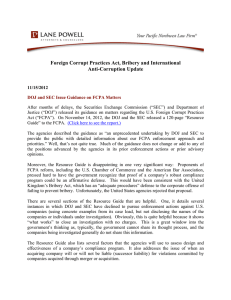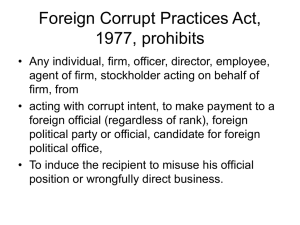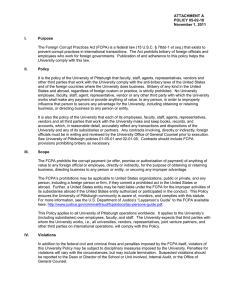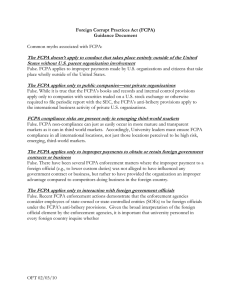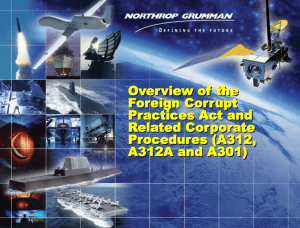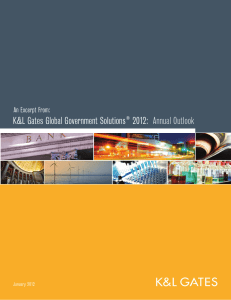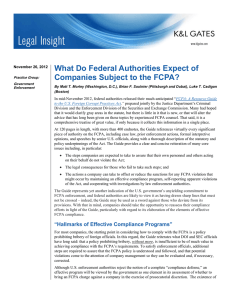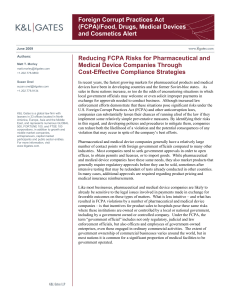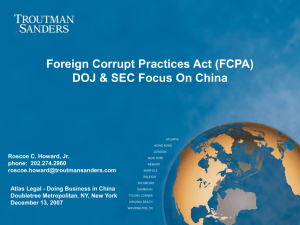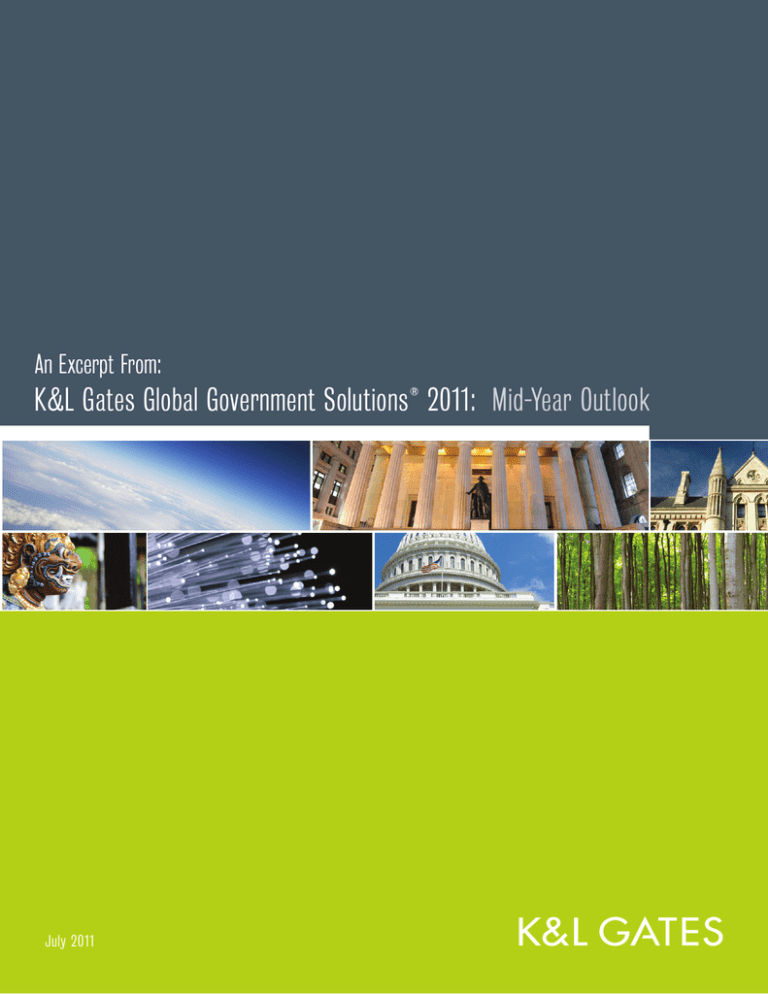
An Excerpt From:
K&L Gates Global Government Solutions ® 2011: Mid-Year Outlook
July 2011
Anti-corruption
Foreign Corrupt Practices Act/Anticorruption:
As Aggressive Law Enforcement Efforts Continue, Countertrends Begin to Emerge
The battle against international corruption continues to intensify, with U.S.
authorities imposing multimillion dollar penalties on companies and seeking
prison terms for corporate personnel who violate the Foreign Corrupt Practices Act
(“FCPA”). On the international stage, all eyes are on the United Kingdom, as the
reinvigorated Bribery Act comes into effect, and new anticorruption initiatives are
underway in Russia, China, and India.
At the same time, other developments
suggest the limits of these efforts.
Enforcement of anticorruption laws by
many other developed nations continues
to be, at best, lackluster. Defendants
are increasingly mounting challenges
to the aggressive legal positions taken
by U.S. law enforcement authorities as
to FCPA’s jurisdictional and substantive
provisions, and critics of the current FCPA
enforcement environment are beginning
to gain a hearing in Congress.
Among the most important developments
thus far in 2011 are the following.
FCPA enforcement continues at a
rapid pace, with prosecutions of both
companies and individuals. 2011 has
brought two of the 10 largest FCPA
settlements in the history of the statute,
totaling $290 million. Six of the 10
largest settlements, amounting to a total
of $1.5 billion, were reached in 2010.
Individual prosecutions continue apace,
with at least four guilty pleas, two
56
convictions, and nearly 20 individuals in
the midst of or awaiting trial.
International efforts against corruption
remain highly visible, although the real
impact of these measures remains uncertain
(see next article). Most of the world’s highly
developed nations agreed in 1997,
through the Organisation for Economic
Co-operation and Development’s (“OECD”)
Convention on Combating Bribery of
Foreign Public Officials, to adopt laws
similar to the FCPA, and by 2002, these
member states had done so. A recent
report by Transparency International
noted, however, that out of the nearly 40
signatories to the Convention, only seven
were actively enforcing their laws, while
more than half had made little or no effort
to enforce them.
At the same time, several major nonparties to the Convention have tightened
their anticorruption laws. Russia revised
its corruption law to conform to the
OECD Convention and joined the
K&L Gates Global Government Solutions ® 2011 Mid-Year Outlook
OECD Working Group on Bribery as a
preliminary step towards accession to the
Convention. China revised its corruption
law to criminalize bribery of foreign
public officials, and India’s Foreign
Contribution Regulation Act, which aims
in part to stem the tide of corruption
through regulating the use of funds
received from abroad, went into effect.
All eyes are on how vigorously the United
Kingdom will enforce its revised Bribery
Act, which took effect on July 1, 2011
(see next article). Law enforcement
investigations of international conduct
are generally very time-consuming and
expensive, and this factor, combined with
the U.K. government’s severe budgetary
crisis, may constrain enforcement of
the Bribery Act. On the other hand, the
U.K. may be seeking to emulate the
U.S. model of FCPA enforcement, which
provides what Assistant Attorney General
Lanny Breuer has termed a “remarkable
return” on investment. Efforts by the U.S.
Justice Department’s Criminal Division,
which operates on an annual budget
of less than $200 million, brought in
$1 billion in FCPA penalties during
2010—amounting to nearly one-third of
all criminal settlements and judgments
obtained by the department in 2010.
Anti-corruption
Enforcement of anticorruption laws by many other developed nations continues to be, at best, lackluster.
A significant increase in FCPA
prosecutions is expected to result from the
newly effective Dodd-Frank whistleblower
provisions, which offer the prospect of
large cash awards. Where an informant’s
tip leads to a successful prosecution in
which the government recovers at least
$1 million, the person who provided that
information is entitled to receive between
10 and 30 percent of the amount
recovered. Given that many such cases
have been resolved for tens or hundreds
of millions of dollars, there is a very real
prospect of multi-million dollar awards
being paid.
Federal courts are increasingly
scrutinizing the parameters of
FCPA liability. Because most FCPA
prosecutions have been resolved by
settlements between the government and
corporations, there have been relatively
few judicial interpretations of the FCPA,
even as government prosecutors have
pursued increasingly aggressive theories
of liability. Corporate defendants rarely
litigate FCPA cases, and prosecutorial
positions are rarely tested before a judge.
But with the government’s announced
intention to bear down on individual
defendants, more cases are now making
their way to court, as individuals facing
prison time have significantly greater
incentives to challenge the charges made
against them. Thus far, the government’s
positions have been sustained, but that is
unlikely to continue indefinitely.
corporate liability, limiting successor liability,
and creating an affirmative defense for
companies with effective FCPA compliance
programs. While these initiatives have yet
to achieve real traction, it is notable that
they have achieved a place on the agenda
for discussion.
Matt T. Morley (Washington, D.C.)
matt.morley@klgates.com
Brian F. Saulnier (Pittsburgh and Dubai)
brian.saulnier@klgates.com
Proposals for revision of the FCPA are
gaining an initial degree of attention in
Congress. The U.S. Chamber of Commerce
and others have been working to gather
support for revisions of the FCPA, and in
June 2011, a subcommittee of the House
Judiciary Committee heard testimony on the
issues of narrowing the Act’s definition of
“foreign official,” raising the standard for
K&L Gates Global Government Solutions ® 2011 Mid-Year Outlook
57
Anchorage Austin Beijing Berlin Boston Brussels Charlotte Chicago Dallas Doha Dubai Fort Worth Frankfurt Harrisburg Hong Kong
London Los Angeles Miami Moscow Newark New York Orange County Palo Alto Paris Pittsburgh Portland Raleigh Research Triangle Park
San Diego San Francisco Seattle Shanghai Singapore Spokane/Coeur d’Alene Taipei Tokyo Warsaw Washington, D.C.
K&L Gates includes lawyers practicing out of 38 offices located in North America, Europe, Asia and the Middle
East, and represents numerous GLOBAL 500, FORTUNE 100, and FTSE 100 corporations, in addition to growth
and middle market companies, entrepreneurs, capital market participants and public sector entities. For more
information about K&L Gates or its locations and registrations, visit www.klgates.com.
This publication is for informational purposes and does not contain or convey legal advice. The information herein should not be used or relied upon in regard to
any particular facts or circumstances without first consulting a lawyer.
©2011 K&L Gates LLP. All Rights Reserved.

